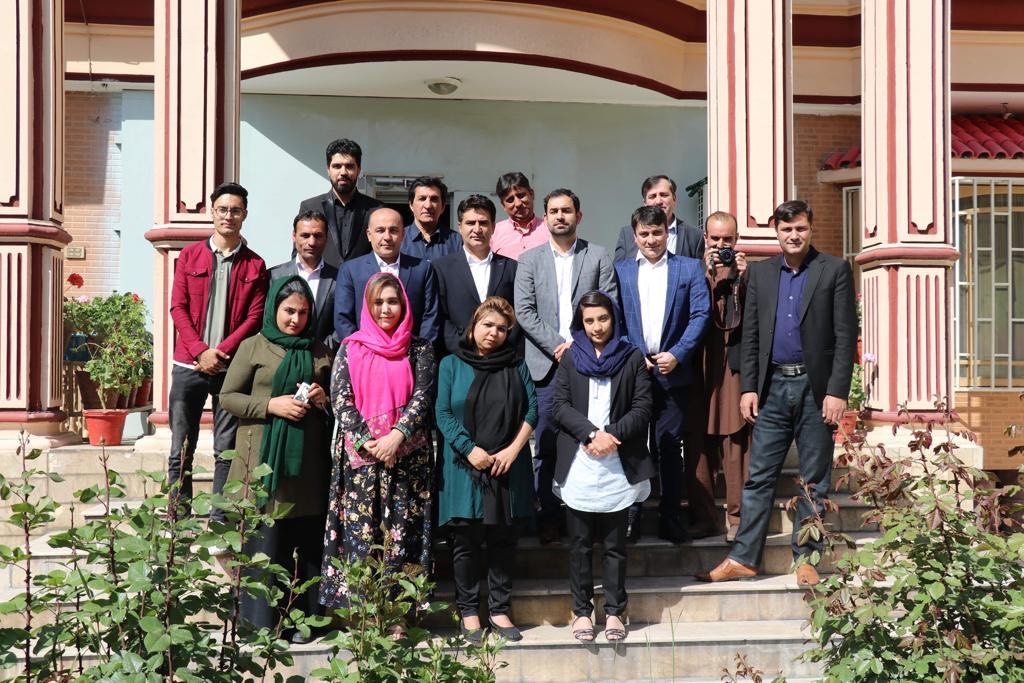Staff and journalists of Radio Azadi, 2019 winner

RFE/RL’s Radio Free Afghanistan, locally known as Radio Azadi, is a leading media outlet in Afghanistan and one of the most listened to on the radio, reaching 25 percent of the adult audience nationally. Radio Azadi provides 12 hours of consecutive live broadcast in two main Afghan national languages: Dari and Pashto. Its news bureau, located in in the Afghan capital of Kabul, is headquarters to dedicated journalists and staff, who report on subjects including politics, extremism, corruption, culture, and minority issues that are under-reported or misreported by other media. The bureau is supported by a local, Dari- and Pashto-speaking reporting network that spans the country.
Radio Azadi journalists in Kabul – and across around the country – work in an increasingly hostile and dangerous environment. Reporters face extreme pressures and threats from warlords, the Taliban, and other extremist groups.
In one of the worst attacks on journalists in Afghanistan, Radio Azadi suffered a devastating loss, with multiple journalists killed in a targeted suicide bombing in Kabul on April 30, 2018. The journalists were covering an earlier suicide attack when a second bomber, disguised as a reporter, approached them and detonated his explosives. RFE/RL lost three young colleagues in the attack, which killed two RFE/RL journalists and a trainee less than a kilometer away from RFE/RL’s Kabul bureau.
Our fallen colleagues included reporter Abadullah Hananzai, video producer Sabawoon Kakar, and Muharram Durrani, who was being trained ahead of joining Radio Azadi. These slain young journalists saw RFE/RL as a way to make Afghanistan a better place.
The attack on our journalists came only few days ahead of World Press Freedom Day, and was the first time RFE/RL lost its journalists on the job in a war zone.
Despite the tragedy, Radio Azadi remains undeterred – and continues its professional work with dedication. Our colleagues are risking their lives daily to cover the frequent terror attacks and to provide Radio Azadi’s audiences with accurate, balanced and timely information. Their reporting informs Afghans about the real motives of the extremist militant groups, tells the stories of the victims of terror attacks, and shows how their families cope with the tragedy of their loss.
Radio Azadi’s Kabul bureau strongly focuses on countering the propaganda put out by radical militants, but its coverage also addresses a wide range of issues and achieves impact in the country through its reporting, including its US State Department-funded counternarcotics reporting.
As part of its strategy, Radio Azadi focuses on youth and women by providing them with the space for open discussions on our various platforms. The Kabul bureau produces over five hours of special dynamic and interactive programs every week for youth and women, including four hours of live call-in shows that are aimed at encouraging women and youth to debate their future role in Afghan society, politics, and the economy. As an important partner with civil society and human rights groups, Radio Azadi also produces content that builds awareness of many human rights issues, including children and women’s’ rights. These weekly programs are produced in cooperation with UNICEF and the Afghanistan Human Rights Independent Commission.
Radio Azadi regularly publishes stories that directly affect people’s lives — such as the profile of 19-year-old Gul Nesa, whose dream of becoming a teacher resulted in the creation of an educational center in her village that provides 50 girls and women with free education. Other reports have prompted societal attention, and public contributions of support, including a report on the plight of a 97 year-old man forced to peddle watering cans, and a report on Ada, a 12 year-old Afghan girl in Kabul who is her family’s primary breadwinner.
Radio Azadi is an online pioneer and media leader in Afghanistan, reaching its nationwide audience via radio, SMS, social platforms such as Facebook and YouTube, and the Internet. Radio Azadi’s Kabul-based digital team produces content for its website and other digital platforms in both Dari and Pashto. Its website has a monthly average of a million visits, and Radio Azadi is also extremely popular on social media, with a total of more than 4.2 million fans on Facebook and eight million engaged users.
Radio Azadi’s impact within Afghanistan is reinforced by the numerous letters of appreciation from journalists’ rights groups and political leaders for its contributions to democracy, human rights and peace in the country. In 2019, the Afghanistan National Association, the NGO “NAI-Supporting Open Media in Afghanistan,” Afghanistan’s National Journalist Union, and others delivered letters of appreciation to Radio Azadi for its work.
